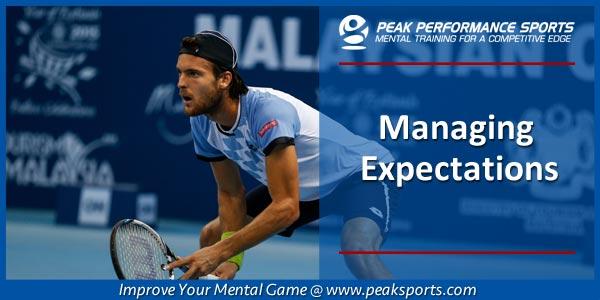Perfectionism In Sports
Many athletes believe the pursuit of perfection is critical for success. These athletes feel the quest for perfection results in better and better performances.
But does perfectionism improve performance? Striving for perfection in practice, yes. Trying to perform perfectly, no…
The need to perform perfectly creates a tremendous amount of stress for athletes.
Perfectionists are their own worst enemies and harshest critics.
The strict expectations some athletes place on themselves can cause them to implode when they fail to perform up to their standards.
Perfectionists constantly worry about making mistakes, letting others down and not measuring up to their own high standards.
When perfectionists do not perform up to their expectations, they become frustrated, lose focus by dwelling on the past, and in some cases, quit their sport.
Sport psychology experts Andrew P. Hill and Thomas Curran investigated the relationship between perfectionism and burnout (Personality and Social Psychology Review, 2015) and found that perfectionism hurts athletes’ performance.
HILL: “Perfectionism [creates] fears and doubts about personal performance, which creates stress that can lead to burnout… It also can make it difficult to cope with setbacks because every mistake is viewed as a disaster.”
Think about it… If perfection is the goal, anything less than perfection is considered failure. The “need-to-be-perfect” mentality generates a huge amount of pressure, anxiety and fear of failure.
Eventually, you break under the weight of those unrealistic expectations and become physically and emotionally worn out.
Let’s make one important distinction, perfectionism is not having high standards; it is having unrealistic standards.
In reality, perfectionism often sabotages your competitive performance because athletes become excessively negative, self-critical and harsh on themselves.
Researcher Andrew Hill believes athletes should focus on achievable goals; the ability to objectively evaluate their progress; the faculty to learn from mistakes; and the ability to give themselves credit for the small successes as they work towards their goals.
HILL: “People need to learn to challenge the irrational beliefs that underlie perfectionism by setting realistic goals, accepting failure as a learning opportunity, and forgiving themselves when they fail. Creating environments where creativity, effort and perseverance are valued also would help.”
Instead of pursuing perfection, athletes are better served pursuing excellence.
- Excellence is pushing the limits of your performance.
- Excellence is the pursuit of trying to achieve more today than yesterday. Excellence is exploring your potential as an athlete.
- Excellence rewards effort and not just accomplishment.
- Excellence motivates; perfection decimates.
Tip for pursuing excellence while managing expectations:
Instead of trying to perform perfectly, focus on “functional” performances. Sometimes you can perform well and get the job done, but it does not look or feel perfect.
Lastly, plan for how you will manage mistakes that happen along the way. That is to say… How will you learn from your mistakes and weave into your plan strategies to cope with mistakes when they happen?
For example, remind yourself that the goal is not to perform perfectly and that mistakes are part of sports.
Related Sports Psychology Articles
- All or None Thinking: One Trap For Perfectionists
- Fear of Failure in Perfectionist Athletes
- Perfectionist Athletes Who Are Highly Judgmental
*Subscribe to The Sports Psychology Podcast on iTunes
*Subscribe to The Sports Psychology Podcast on Spotify
Download a free sports psychology report to improve your mental game!
Learn more about our one-on-one mental game coaching.
The Fearless Athlete

For the last two decades, I’ve been working with athletes and helping them optimize their physical ability by teaching them the secrets of top performing athletes. Now, you too can learn how to regain that child-like fearless attitude.
Mental toughness is what separates the winner from the loser in any competition. Champion athletes train hard in practice, perform without fear in competition, and trust their skills in crunch-time.
The Fearless Athlete program is ideal for any athlete that wants to overcome fear of failure and uncover inhibiting perfectionistic traits; or for any coach or parent who wants to teach athletes to perform with trust and freedom in competition.

